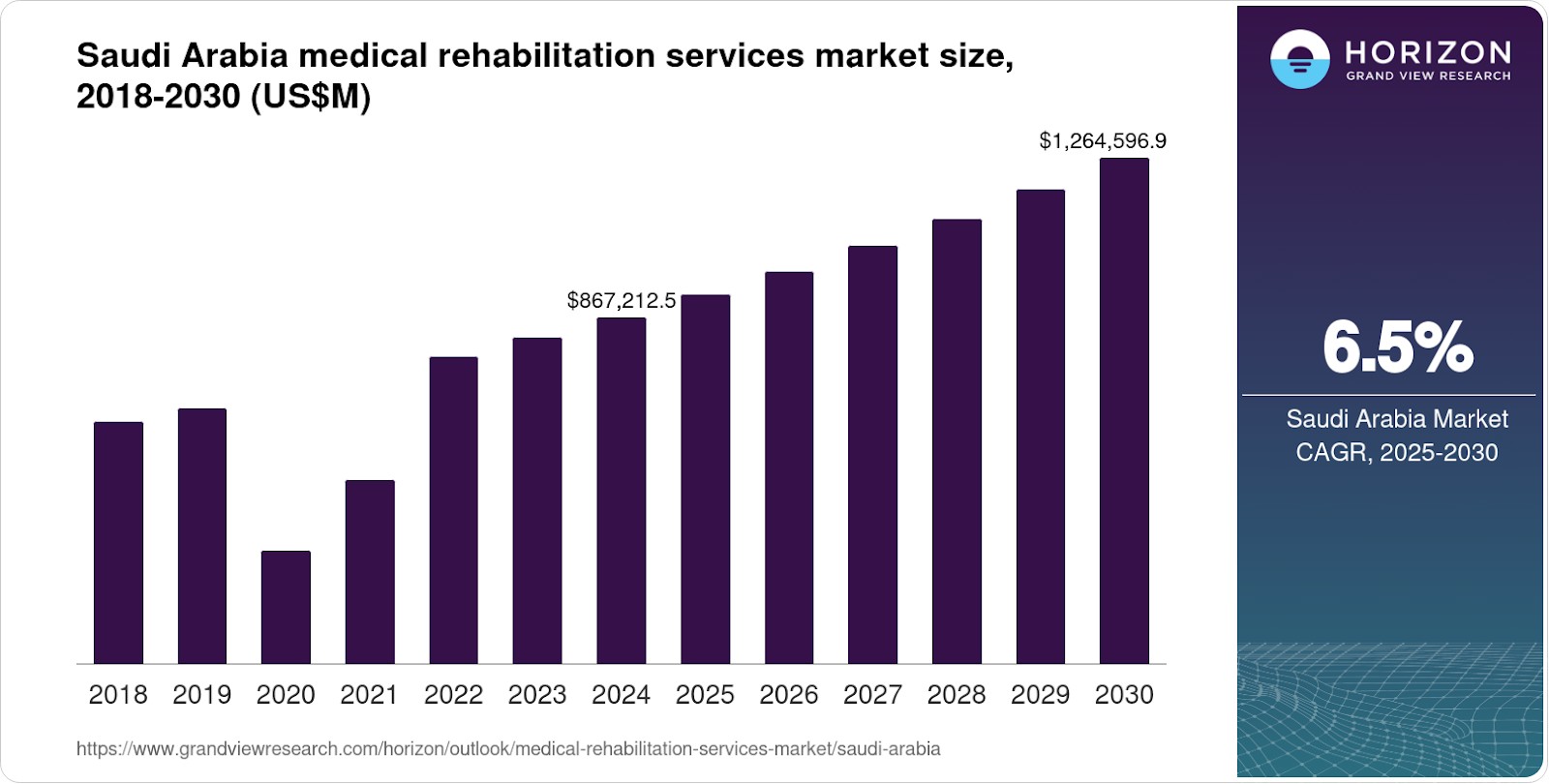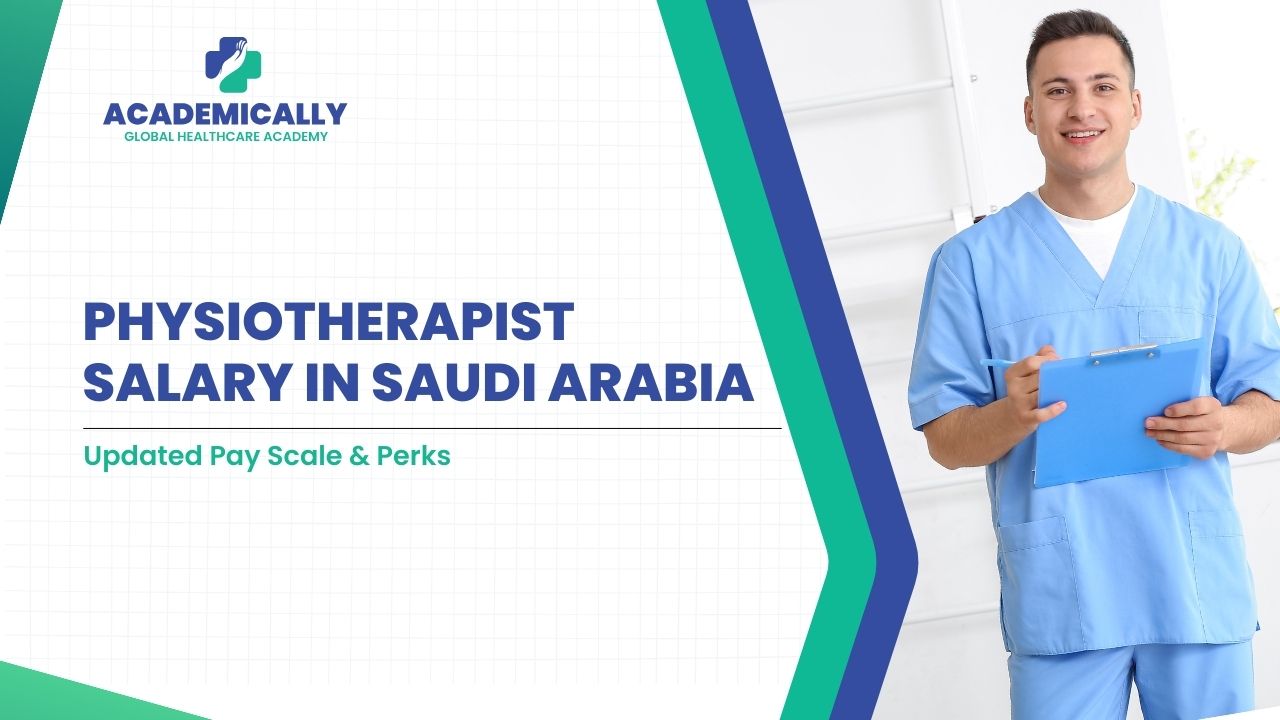Did you know… the Arab countries, especially Saudi Arabia, are witnessing major macroeconomic and demographic shifts? Yes, you heard it right. Statistics indicate that Saudi Arabia offers a highly favorable environment for physiotherapists. Here’s a market outlook chart showing projected growth in Saudi Arabia’s medical rehabilitation services sector, including physiotherapy from 2024 to 2030. Revenue is expected to rise at a 6.5% CAGR.

This guide walks you through the physiotherapist salary in Saudi Arabia 2025. covering pay ranges, benefits, specialisations, and career growth. We’ll also share insider stories, expert tips, and a breakdown of salaries by city, sector, and experience level. Whether you’re a fresh graduate or a senior specialist, this blog will help you map your career and maximise your earnings. The sector is poised for sustained growth. Here’s what’s driving it:
Booming Rehabilitation Market & Vision 2030
Digital Health & AI Integration
- The government is investing in digital innovations like the Seha Virtual Hospital. It supports over 224 hospitals and offers 44 specialty services virtually.
- In May 2025, Saudi Arabia launched the world’s first AI-powered doctor clinic, "Dr. Hua", in Al Ahsa. This marks a significant step toward integrating AI into everyday healthcare.
- These digital advances open up a new role for physiotherapists in telerehabilitation, AI-assisted diagnostics, and remote patient monitoring. This expands the profession’s scope and impact.
Talent Shortages & Localisation Policies
Healthcare workforce projections show a growing shortage of Saudi professionals in fields like physiotherapy by 2030. This drives demand for both expat and locally trained physiotherapists. This shortage is particularly acute in advanced clinical roles. It highlights opportunities for specialists and those with SCFHS licenses (SPLE) to command higher salaries.
Salary Breakdown by Career Stage
Your career stage is the single most important factor in determining your physiotherapist salary in Saudi Arabia. Hospitals and clinics in the Kingdom generally follow structured pay scales, but performance, specialisation, and continuous training can accelerate income growth.
Fresh Graduates (0–2 years)
- Salary range: SAR 7,000 – 9,000/month (approx. ₹1,54,000 – ₹1,98,000 or $1,890 – $2,430).
- Most freshers work as junior physiotherapists under supervision.
- Tasks: basic rehabilitation exercises, assisting seniors, and patient follow-up.
- Benefits: housing allowance, visa costs, aand nnual flight ticket are usually included.
Early Career (2–5 years)
- Salary range: SAR 10,000 – 13,000/month (approx. ₹2,20,000 – ₹2,86,000 or $2,700 – $3,510)
- Greater responsibility—independent patient handling, documentation, and therapy planning.
- Opportunities to move from public hospitals to private specialty clinics
Mid-Level (6–10 years)
- Salary range: SAR 14,000 – 18,000/month (approx. ₹3,08,000 – ₹3,96,000 or $3,780 – $4,860)
- Specialists in orthopedics, neurology, or sports rehab are in demand.
- Supervisory roles open up, team leaders in rehab departments.
- Possibility of earning performance bonuses in private hospitals.
Senior Specialists (10–15 years)
- Salary range: SAR 18,000 – 22,000/month (approx. ₹3,96,000 – ₹4,84,000 or $4,860 – $5,940).
- Advanced expertise in fields like sports rehabilitation or neuro-rehab.
- Trusted by hospitals for complex patient cases.
- Often offered consultant roles and opportunities for private practice collaboration.
Leadership / Consultant Level (15+ years)
- Salary range: SAR 25,000 – 35,000+/month (approx. ₹5,50,000 – ₹7,70,000+ or $6,750 – $9,450+).
- Department heads or clinic owners.
- May manage large physiotherapy teams across multi-specialty hospitals.
- Enjoy prestige, influence, and the ability to mentor younger physiotherapists.
Case Study: Sara’s Journey in Riyadh
When Sara, a physiotherapist from India, moved to Riyadh in 2016, she started with a salary of SAR 8,000/month (approx. ₹1,76,000 or $2,160) at a government hospital.
- In her first 2 years, she focused on improving her Arabic and patient communication.
- By 2019, with 3 years of experience, she switched to a private orthopedic clinic, raising her salary to SAR 12,500/month (approx. ₹2,75,000 or $3,375)..
- She then completed a Sports Rehabilitation certification and joined a high-performance sports medicine center in 2022, where she earned SAR 17,000/month (approx. ₹3,74,000 or $4,590).
- In 2025, now with nearly 9 years of experience, she is a senior physiotherapist in Riyadh, earning SAR 20,000/month (approx. ₹4,40,000 or $5,400), with additional perks like housing allowance and yearly performance bonuses.
Sara’s journey shows how strategic upskilling, networking, and moving between sectors can significantly boost physiotherapist salaries in Saudi Arabia.
Salary by Experience Level
While career stages show a broad picture, breaking salaries down by exact years of experience gives us a sharper insight. In Saudi Arabia, pay increments are linked not just to years worked, but also to the sector (government vs private), specialisation, and whether you’ve passed the Saudi Prometric Licensing Exam (SPLE) for Physiotherapists.
Average Salary by Years of Experience (2025)
| Experience Level | Avg. Monthly Salary (SAR) | Equivalent in INR (₹) | Equivalent in USD ($) | Notes |
| 0–2 years | 7,000 – 9,000 | ₹1,54,000 – ₹1,98,000 | $1,890 – $2,430 | Junior roles, under supervision, limited patient independence. |
| 2–5 years | 10,000 – 13,000 | ₹2,20,000 – ₹2,86,000 | $2,700 – $3,510 | Can handle patients independently, eligible for promotions. |
| 6–10 years | 14,000 – 18,000 | ₹3,08,000 – ₹3,96,000 | $3,780 – $4,860 | Mid-level specialists, some team leadership roles. |
| 10–15 years | 18,000 – 22,000 | ₹3,96,000 – ₹4,84,000 | $4,860 – $5,940 | Senior physiotherapists with specialisation (sports, neuro, ortho). |
| 15+ years | 25,000 – 35,000+ | ₹5,50,000 – ₹7,70,000+ | $6,750 – $9,450+ | Department heads, consultants, clinic owners. |
Why Private Hospitals Pay Differently
- Government Hospitals (MOH, Armed Forces, University Hospitals)
- Fixed salary scales, less variation.
- Reliable benefits: housing, insurance, education allowance.
- Salary growth is much rather slow but stable.
- Private Hospitals & Clinics
- More flexibility in pay based on skills, certifications, and negotiation.
- Performance bonuses and revenue-sharing models (in premium clinics).
- Faster growth for physiotherapists with in-demand specialisations.
Did you know: A physiotherapist with 6 years’ experience in a government hospital in Dammam may earn around SAR 15,000/month (≈ ₹3,30,000 or $4,050), while a peer in a private sports medicine clinic in Riyadh could be making SAR 18,000–20,000/month (≈ ₹3,96,000–₹4,40,000 or $4,860–$5,400) with bonuses.
Salary by Specialisation
Not all physiotherapy fields pay the same in Saudi Arabia. Some specialisations, such as sports rehab and neurological physiotherapy, command premium salaries due to the combination of higher demand and limited supply of trained professionals.
Average Physiotherapist Salary in Saudi Arabia by Specialisation (2025)
| Specialisation | Avg. Monthly Salary (SAR) | Avg. Monthly Salary (INR) | Avg. Monthly Salary (USD) | Typical Workplaces |
| Orthopedic Rehab | 12,000 – 18,000 | ₹2,64,000 – ₹3,96,000 | $3,240 – $4,860 | Hospitals, trauma centers, post-surgery care |
| Neurological Physio | 14,000 – 20,000 | ₹3,08,000 – ₹4,40,000 | $3,780 – $5,400 | Neuro clinics, stroke rehab centers |
| Sports Rehabilitation | 15,000 – 22,000 | ₹3,30,000 – ₹4,84,000 | $4,050 – $5,940 | Sports clubs, elite gyms, sports medicine hospitals |
| Pediatric Physio | 11,000 – 16,000 | ₹2,42,000 – ₹3,52,000 | $2,970 – $4,320 | Children’s hospitals, special education centers |
| Geriatric Physio | 10,000 – 15,000 | ₹2,20,000 – ₹3,30,000 | $2,700 – $4,050 | Elderly care facilities, home healthcare |
| Women’s Health | 12,000 – 17,000 | ₹2,64,000 – ₹3,74,000 | $3,240 – $4,590 | Maternity hospitals, private women’s wellness centers |
Case Story: Ahmed’s Sports Rehab Journey
When Ahmed, a physiotherapist from Egypt, moved to Jeddah in 2017, he began with a salary of SAR 11,000/month in a government hospital. He soon noticed the rising demand for sports physiotherapy, especially with Saudi Arabia investing heavily in football clubs and athletic programmes.
- In 2020, Ahmed pursued an international certification in sports rehabilitation.
- Within a year, he transitioned to a private sports medicine center in Jeddah, increasing his salary to SAR 16,500/month (≈ ₹3,63,000 or $4,455).
- By 2024, after working with professional football teams, his monthly salary crossed SAR 21,000 (≈ ₹4,62,000 or $5,670), plus he started receiving consulting fees for part-time club contracts.
Ahmed’s story shows how choosing a niche specialisation can increase earnings by 30–40% within a few years.
Salary by City & Region
| City | Avg. Monthly Salary (SAR) | Avg. Monthly Salary (INR) | Avg. Monthly Salary (USD) | Notes |
| Riyadh | 12,000 – 20,000 | ₹2,64,000 – ₹4,40,000 | $3,240 – $5,400 | Highest demand due to government hospitals, private clinics, and sports centers. |
| Jeddah | 11,000 – 18,500 | ₹2,42,000 – ₹4,07,000 | $2,970 – $4,995 | Strong private healthcare sector, especially orthopedic & sports clinics. |
| Dammam | 10,500 – 17,000 | ₹2,31,000 – ₹3,74,000 | $2,835 – $4,590 | Key hub in the Eastern Province, growing demand for neuro-rehab. |
| Eastern Province (Khobar, Dhahran, Jubail) | 10,000 – 16,500 | ₹2,20,000 – ₹3,63,000 | $2,700 – $4,455 | Industrial cities, rising need for occupational & physical rehab. |
Insights
- Riyadh leads by example: Being the capital and medical hub, Riyadh consistently offers the highest physiotherapist salaries. Many expats prefer Riyadh for career growth.
- Jeddah follows closely: With a strong private sector and international community, Jeddah pays slightly less than Riyadh but offers better lifestyle perks.
- Eastern Province demand: Dammam, Khobar, and Dhahran are experiencing a surge in demand due to the rehabilitation needs of industrial workers. Salaries are lower, but the cost of living is also cheaper.
Did you know: A mid-level physiotherapist with 7 years of experience can earn SAR 19,000/month (≈ ₹4,18,000 or $5,130) in Riyadh, while the same role in Dammam may pay around SAR 16,000/month (≈ ₹3,52,000 or $4,320).
Public vs Private Sector Salaries
Government Hospitals (MOH, Armed Forces, University Hospitals)
- Salary Range (2025): SAR 10,000 – 18,000/month (≈ ₹2,20,000 – ₹3,96,000 or $2,700 – $4,860).
- Fixed pay scales based on years of service.
- Attractive allowances (housing, transport, medical, annual flights).
- Job security and structured career progression.
- Promotions are slower and less flexible.
Private Hospitals & Clinics
- Salary Range (2025): SAR 12,000 – 22,000+/month (≈ ₹2,64,000 – ₹4,84,000+ or $3,240 – $5,940+).
- Salaries vary depending on specialisation, negotiation skills, and certifications.
- Higher potential for performance bonuses and revenue-sharing (especially in sports or ortho clinics).
- Faster growth for ambitious physiotherapists.
- Less job security compared to government roles.
Public vs Private Sector Comparison
| Factor | Government Hospitals | Private Hospitals/Clinics |
| Base Salary | 10,000 – 18,000 SAR (≈ ₹2,20,000 – ₹3,96,000 / $2,700 – $4,860) | 12,000 – 22,000+ SAR (≈ ₹2,64,000 – ₹4,84,000+ / $3,240 – $5,940+) |
| Allowances & Perks | Housing, transport, flights, insurance | Varies; high-end clinics may offer similar perks |
| Job Security | Very high (long-term contracts) | Moderate (performance-driven) |
| Career Growth | Slow but steady | Faster, merit-based |
| Workload | Balanced, structured | Can be intensive, especially in private sports/rehab centers |
| Best For | Stability & family benefits | Higher income & faster growth |
Expert Insight: A physiotherapist working at a Ministry of Health hospital in Riyadh might earn SAR 15,000/month (≈ ₹3,30,000 or $4,050), while a peer in a premium sports clinic in Jeddah could be making SAR 20,000+/month (≈ ₹4,40,000+ or $5,400+) with bonuses.
Other Salary Influencing Factors
Besides experience, specialisation, and location, several other factors can affect a physiotherapist’s salary in Saudi Arabia. Understanding these can help professionals negotiate better pay and plan their career growth more strategically.
Gender Pay Gap
- In general, Saudi Arabia has reduced pay disparities between male and female healthcare professionals.
- However, in some private clinics, male physiotherapists may earn slightly higher due to working longer hours or handling sports/orthopedic cases.
Expat vs Saudi Salaries
- Expat physiotherapists often start with higher base salaries, especially from countries like India, the Philippines, and Egypt.
- Saudi nationals may receive additional benefits (e.g., priority promotions, government incentives) as part of localisation efforts.
Certifications & Special Training
- Skills like Dry Needling, Manual Therapy, Kinesio Taping, Sports Rehab, or Neuro-Rehab significantly boost salaries.
- Example: A mid-level physiotherapist with dry needling certification can earn SAR 2,000–3,000/month extra (≈ ₹44,000–₹66,000 or $540–$810) compared to peers without it.
Type of Employer
- Luxury private hospitals and sports medicine centers pay premium salaries.
- Smaller clinics may pay less but allow part-time practice, creating side income opportunities.
Allowances & Benefits
- Housing allowance (up to 25% of salary).
- Transportation allowance (fixed monthly).
- Annual flight tickets for expats.
- Comprehensive health insurance.
How to Increase Your Salary as a Physiotherapist in Saudi Arabia
Unlike fixed government pay scales, physiotherapy salaries in Saudi Arabia can grow significantly faster if you take strategic steps. Certifications, networking, and smart career moves can increase income by 30–50% within a few years.
Practical Tips to Boost Your Salary
- Earn Specialised Certifications
- Dry Needling, Manual Therapy, Sports Rehab, Neuro-Rehab.
- Each certification can add SAR 2,000–4,000/month (≈ ₹44,000–₹88,000 or $540–$1,080) to your pay..
- Master Arabic Communication
- Fluency in Arabic is a major advantage in patient care and promotions.
- Work in Major Cities
- Riyadh & Jeddah pay more than smaller towns.
- Target Private Clinics & Sports Centers
- Higher salaries and bonuses compared to government hospitals.
- Take Leadership Roles
- Moving from therapist → team leader → department head dramatically increases income.
- Pass the SPLE Exam Early
- The Saudi Prometric Licensing Exam (SPLE) unlocks senior-level opportunities.
Step-by-Step Salary Growth Roadmap (5 Years)
| Year | Career Focus | Expected Salary Growth |
| Year 1–2 | Start as a junior physiotherapist. Focus on SPLE licensing & building confidence. | SAR 9,000–10,000 (≈ ₹1,98,000–₹2,20,000 or $2,430–$2,700) |
| Year 3 | Move to a private clinic or specialised hospital. Earn first certification (e.g., Manual Therapy). | SAR 12,000–14,000 (≈ ₹2,64,000–₹3,08,000 or $3,240–$3,780) |
| Year 4 | Gain experience in a niche (sports rehab, neuro, or ortho). Build patient network. | SAR 15,000–17,000 (≈ ₹3,30,000–₹3,74,000 or $4,050–$4,590) |
| Year 5 | Apply for senior physiotherapist/lead roles. Add advanced certification. | SAR 18,000–20,000+ (≈ ₹3,96,000–₹4,40,000+ or $4,860–$5,400+) |
Quick Example: A physiotherapist with 7 years of experience in Jeddah earns SAR 16,000/month (≈ ₹3.52 lakh or $4,320). After completing a manual therapy certification and moving to Riyadh, their salary jumped to SAR 20,500/month (≈ ₹4.51 lakh or $5,530) within a year.
Benefits & Perks Beyond Base Salary
One of the biggest advantages of working in Saudi Arabia is that salaries are tax-free. But beyond the base pay, physiotherapists also receive a generous set of benefits and perks that significantly improve their overall compensation.
Common Benefits for Physiotherapists in Saudi Arabia
- Housing Allowance – Often 20–25% of the monthly salary, or employer-provided furnished housing.
- Transport Allowance – Either a monthly stipend or free shuttle service.
- Annual Flight Ticket – For the employee (and sometimes family members).
- Comprehensive Medical Insurance – Covers employee and dependents.
- Paid Annual Leave – Usually 30–45 days per year.
- End-of-Service Gratuity – A lump-sum payment after completing contract years, as per Saudi labor law.
- Visa & Licensing Fees Covered – Employers usually handle these costs for expat physiotherapists.
- Professional Development Support – Some employers sponsor courses, workshops, or certifications.
- Overtime & On-Call Pay – Particularly in hospitals and rehabilitation centers.
Sample Physiotherapist Benefits Package (Mid-Level Role in Riyadh, 2025)
- Base Salary: SAR 15,000/month (≈ ₹3,30,000 or $4,050)
- Housing Allowance: SAR 3,000/month (20%) (≈ ₹66,000 or $810)
- Transport Allowance: SAR 1,000/month (≈ ₹22,000 or $270)
- Annual Flight Ticket: For employee + spouse
- Medical Insurance: Full coverage for family
- Paid Leave: 35 days per year
- End-of-Service Gratuity: SAR 45,000 after 3 years (approx. ₹9,90,000 or $12,150).
- Licensing & Visa Costs: Fully covered by employer
Total effective monthly value = SAR 20,000+ (approx. ₹4,40,000+ or $5,400+ including perks).
Did you know: A Filipino physiotherapist in Jeddah reported that although his base salary was SAR 13,000 (≈ USD 3,470 / ₹2.89 lakh), the total package with housing, insurance, and flights made it feel like SAR 18,500/month (≈ USD 4,935 / ₹4.12 lakh) in value.
Benefits & Perks Beyond Base Salary
One of the biggest advantages of working in Saudi Arabia is that salaries are tax-free. But beyond the base pay, physiotherapists also receive a generous set of benefits and perks that significantly improve their overall compensation.
Common Benefits for Physiotherapists in Saudi Arabia
- Housing Allowance – Often 20–25% of the monthly salary, or employer-provided furnished housing.
- Transport Allowance – Either a monthly stipend or free shuttle service.
- Annual Flight Ticket – For the employee (and sometimes family members).
- Comprehensive Medical Insurance – Covers employee and dependents.
- Paid Annual Leave – Usually 30–45 days per year.
- End-of-Service Gratuity – A lump-sum payment after completing contract years, as per Saudi labor law.
- Visa & Licensing Fees Covered – Employers usually handle these costs for expat physiotherapists.
- Professional Development Support – Some employers sponsor courses, workshops, or certifications.
- Overtime & On-Call Pay – Particularly in hospitals and rehabilitation centers.
Physiotherapist Benefits Package (Mid-Level Role in Riyadh, 2025)
- Base Salary: SAR 15,000/month (₹3,33,000 / $4,050)
- Housing Allowance: SAR 3,000/month (20%) (₹66,600 / $810)
- Transport Allowance: SAR 1,000/month (₹22,200 / $270)
- Annual Flight Ticket: For employee + spouse
- Medical Insurance: Full coverage for family
- Paid Leave: 35 days per year
- End-of-Service Gratuity: SAR 45,000 after 3 years
- Licensing & Visa Costs: Fully covered by employer
Total effective monthly value = SAR 20,000+ (≈ ₹4.4 lakh / $5,400) per month (including perks)
Did you know: A Filipino physiotherapist in Jeddah reported that although his base salary was SAR 13,000 (≈ USD 3,470 / INR 2.89 lakh), the total package with housing, insurance, and flights made it feel like SAR 18,500/month (≈ USD 4,930 / INR 4.11 lakh) in value.
Licensing & Registration (SPLE Process)
Before practicing in Saudi Arabia, every physiotherapist must pass the Saudi Prometric Licensing Exam (SPLE). This is regulated by the Saudi Commission for Health Specialties (SCFHS) and is mandatory for both local and international professionals.
SPLE Licensing Process for Physiotherapists:
- Eligibility: You need a BPT/DPT or MPT/MS in Physiotherapy, a valid home-country license, and at least one year of post-internship experience.
- Document Preparation: Collect degree certificates, transcripts, active license, work experience letters, and a Good Standing Certificate.
- DataFlow Verification: Submit documents through the SCFHS DataFlow portal for Primary Source Verification (takes 2–3 weeks).
- Mumaris Plus Account: Register on the SCFHS Mumaris Plus portal to begin the licensing process.
- Professional Classification:
- With MPT/MS – Apply via “Direct Decision”; you may face an interview and could be licensed without the exam.
- With BPT/DPT – You must take the Prometric exam; classification depends on degree/experience.
- Prometric Exam: Attempt the computer-based Saudi Prometric Exam if required.
- Professional Registration: After passing the exam/interview, apply on Mumaris Plus to get your SCFHS physiotherapy license.
Pro Tip: Clear the SPLE early in your career. Passing it not only unlocks jobs in Saudi Arabia but also helps in securing higher-paying roles much faster.
Salary Growth Forecast (2025–2030)
Based on market expansion and demand trends, here’s a projected salary increase for physiotherapists:
Year | Estimated Avg. Monthly Salary (SAR) | Salary in INR (₹) | Salary in USD ($) | Notes |
| 2025 | 18,000 – 22,000 | ₹399,600 – ₹488,400 | $4,860 – $5,940 | Continued demand for specialists in major cities. |
| 2027 | 20,000 – 25,000 | ₹444,000 – ₹555,000 | $5,400 – $6,750 | Digital and private healthcare growth creates more senior roles. |
| 2030 | 22,000 – 28,000+ | ₹488,400 – ₹621,600+ | $5,940 – $7,560+ | High demand for licensed, specialised physiotherapists in telehealth, geriatrics, and sports. |
To Conclude with…
Physiotherapists in Saudi Arabia in 2025 are entering one of the most rewarding phases of the profession. Salaries are competitive and tax-free, benefits packages are generous, and the healthcare system is rapidly expanding under Vision 2030. Whether you’re a new graduate aiming for your first overseas contract or a seasoned specialist targeting senior-level positions, the Kingdom offers unmatched opportunities for professional and financial growth.
We’ve seen how pay varies by experience, specialisation, city, and sector. Still, one fact remains constant: licensing and continuous skill development are the keys to unlocking higher salaries and better roles.
If you’re serious about building your physiotherapy career in Saudi Arabia, the journey begins with passing the SPLE licensing exam. Many candidates stumble here not because they lack knowledge, but because the exam demands structured preparation and familiarity with Saudi healthcare practices.
That’s why at Academically, we’ve built an SPLE Preparation programme tailored for physiotherapists. With AI-based mock tests, study roadmaps, expert mentorship, and community support, we’ve already helped hundreds of professionals transition smoothly into high-paying Saudi careers.





